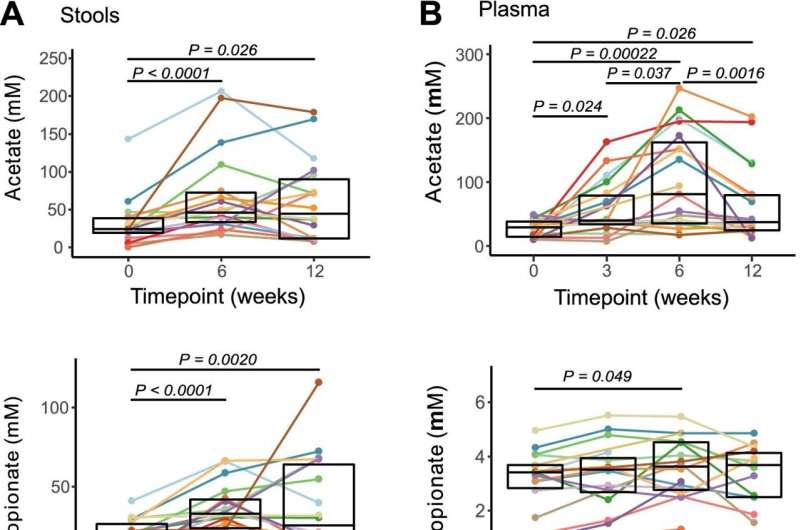Potent food supplement may help halt the immune attack in people with diabetes

A microbiota-targeted clinical trial performed by scientists from Monash University, the University of Sydney, and the University of Queensland shows that a plant-based food supplement could improve gut health and strengthen the immune system in individuals with type 1 diabetes.
Senior author and lead investigator of the clinical trial, Dr. Eliana Marino from Monash University, said the study tested twenty-one adults with type 1 diabetes that incorporated a six-week supplement into their daily diet. As a result, they showed increased production of metabolites called short-chain fatty acids by the gut microbiota, which has an important role in preventing type 1 diabetes.
"People with 1 diabetes have shown altered gut microbiota and reduced production of short-chain fatty acids in stools and blood. We previously have demonstrated that the supplement used in this human study protected mice from diabetes (Marino et al., Nat Immunol 2017)," said Dr. Marino.
The clinical trial published online January 19, 2022, in Microbiome showed that participants' blood immune cells developed a more regulatory phenotype post-intervention.
"We were very excited to find that blood immune cells had become more regulated. Because type 1 diabetes is caused when the immune system becomes too activated and attacks the insulin-producing cells in the pancreas," said co-lead Associate Professor Hamilton-Williams from the University of Queensland.
"Type 1 diabetes is a lifelong autoimmune disease that is on the rise with no cure. Individuals living with type 1 diabetes depend on insulin treatment. As a consequence, they can develop late life-threatening inflammatory complications, such as kidney failure, neurological and cardiovascular diseases," said co-lead Associate Professor Sonia Saad, University of Sydney
"While glucose control and insulin requirements didn't change overall, the participants with the highest short-chain fatty acid concentrations showed the best glucose control after the supplementation," said co-lead Dr. Kirstine Bell. from the Charles Perkins Centre, University of Sydney.
"Using this supplement for longer and starting it earlier in the disease could potentially stop the immune attack, preserving insulin-producing cells and improving glucose regulation," said Dr. Marino.
"This dietary supplementation represents a safe and accessible alternative therapy for many children with type 1 diabetes or other autoimmune diseases. Also, it could decrease the risk of subsequent inflammatory complications such as cardiovascular disease as clinical trials are underway," said Dr. Marino.
The clinical trial was funded by JDRF Australia following its selection from a group of innovative research proposals developed through the JDRF and Macquarie Group Foundation Future Research Leaders Program. The first authors are Dr. Kirstine Bell and Associate Professor Sonia Saad from the University of Sydney and Dr. Bree J. Tillett from the University of Queensland. Other co-authors include Professor Barbara Fazekas de St Groth, Dr. Helen McGuire from the Ramaciotti Facility for Human Systems Biology at The University of Sydney and Charles Perkins Centre, and Dr. Esteban Gurzov from Université libre de Bruxelles.
The paper is in Microbiome titled: Metabolite-based dietary supplementation in human type 1 diabetes is associated with microbiota and immune modulation.
More information: Kirstine J. Bell et al, Metabolite-based dietary supplementation in human type 1 diabetes is associated with microbiota and immune modulation, Microbiome (2022). DOI: 10.1186/s40168-021-01193-9

















